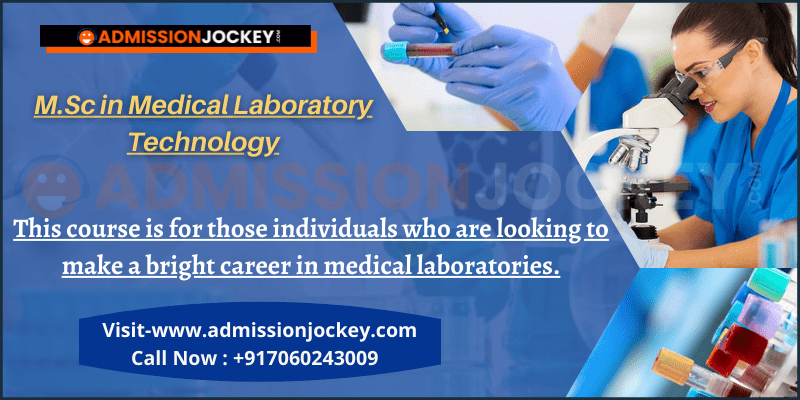M.Sc in Medical Laboratory Technology course
By admin | Last Updated Jul, 2022

M.Sc in Medical Laboratory Technology
M.Sc in Medical Lab Technology course is a 2-year long paramedical program that covers the basics of how to take care of patients as well as accurate diagnosis and testing utilizing clinical laboratory equipment. This course is for those individuals who are looking to make a bright career in medical laboratories.
This course includes subjects such as human anatomy, microbiology, biochemistry, molecular biology, blood bank, cytology, etc. Students are taught how to diagnose and treat various diseases during the curriculum of this course. The students are taught to concentrate on performing clinical tests correctly, which will assist the physician in making an accurate diagnosis of the condition.
After graduating from M.Sc MLT, professionals will be able to work efficiently in hospitals and diagnostic labs. Admission to this program is generally based on merit and the results of entrance exams conducted by various governing bodies. Some institutions base their admissions decisions solely on their performance in graduation.
MLT degree holders can work as lab managers, administrators in healthcare, clinical laboratory supervisors, health inspectors, and education consultants, and in many other positions. In this article, we are going to discuss the complete course details including eligibility, top colleges, syllabus, and job prospects.
Read More about M.Sc in Zoology subject
M.Sc MLT Highlights
| Course Name | M.Sc in Medical Lab Technology |
| Course Level | Post-Graduate |
| Course Duration | 2 Years |
| Exam Type | Semester-wise |
| Course Mode | Regular |
| Eligibility | Graduation with at least 50% aggregate |
| Admission Process | Merit-Based / Entrance-Exam based |
| Average Fees | INR 10,000 to INR 1 LPA |
| Average Starting Salary | INR 3.5 LPA to INR 10 LPA |
| Employment sector | Clinical Labs, Nursing Homes, Public Health Facilities, Path Labs, Hospitals, etc. |
| Top Job Profiles | Lab Manager, Safety Officer, Health Care Administrator, Educational Consultant, etc. |
M.Sc MLT Eligibility Criteria
A basic eligibility criterion is required in order to be considered for admission in the M.Sc MLT course.
- Students must hold a bachelor’s degree or an equivalent degree from a recognized university with a minimum aggregate of at least 55%.
- Candidates who come under the reservation category like ST/SC/OBC/Differently Abled receive a 5 to 10% eligibility relaxation. Under sports quotas, several universities now allow students to choose their own scores.
M.Sc MLT Admission Process
M.Sc MLT Admissions are generally done either on the basis of the Merit list or on the basis of entrance exams which are conducted at the university level.
Merit-Based Admission
- Send your application to the schools or institutions where you want to study.
- Maintain a high grade in your Bachelor’s degree examinations.
- Colleges will issue their cutoff lists in due time. Check to see if you are eligible for the course you want to take.
- Visit the college and submit all needed documentation if you are eligible.
Entrance-Exam Based Admission
- Candidates must first register for the admission examinations.
- Fill out the application form completely, including all required information.
- All relevant documents, such as mark sheets, should be scanned and uploaded. Documents must be uploaded in a certain format that the institute’s application page specifies.
- There is a small application charge that must be paid online when submitting the application form. All online payment methods are available.
- When all candidates have been evaluated for eligibility, admit cards are issued. To use on the day of the examination, the admit card must be downloaded and printed.
- Study the course and previous exams to prepare for the exam.
- Appear within the due time on the time of examination. The entrance exam results will be issued based on the candidates’ performance in the exam.
M.Sc MLT Popular Entrance Exams
Most colleges allow the admissions of students in Masters in Medical lab technology program on the basis of performance in the entrance exams. Some of the most popular entrance exams are mentioned below:
AUCET – AUCET (Andhra University Common Entrance Test) is a state-level entrance examination which is conducted by Andhra University for Bachelor’s and Master’s courses.
CUCET – CUCET (Central University Common Entrance Test) is a national-level entrance examination that is conducted once a year by 14 central universities of the country.
Top M.Sc MLT Colleges in India
There are many colleges in India that offers Masters in Medical Laboratory Technology. Down below are some of the best ones.
- AIIMS Delhi
- Armed Forces Medical College, Pune
- St. Xavier College, Pune
- Maulana Azad Medical College, Delhi
- Jawaharlal Insititute of Postgraduate Medical Education and Research, Puducherry
- CMC Vellore, Vellore
- Madras Medical College, Chennai
- Guru Govind Singh Indraprastha University, New Delhi
M.Sc Medical Lab Technology Syllabus
| Semester 1 | Semester 2 |
| Human Anatomy and Physiology | Medical Microbiology |
| Molecular Biology | Immunology |
| Clinical Biochemistry | Serology |
| Haematology | Blood Bank Lab |
| Molecular Biology Lab | Microbiology |
| Clinical Biochemistry Lab | Research Lab |
| Haematology Lab | Research Methodology |
| Community Medicine Epidemiology |
| Semester 3 | Semester 4 |
| Urine Analysis | Non-Invasive Techniques |
| Human Disorder | Separation Techniques |
| Stool Examination Lab | Pharmaceutical Chemistry |
| Sputum Analysis Lab | Histopathology |
| Hospital Management | Modern Diagnostic |
| Forensic Science | Project |
| Toxicology | Dissertation |
| Modern Medical Practices |
M.Sc in Medical Lab Technology Fees
Although, M.Sc MLT fees vary from college to college. Different private colleges have different average fees structure which they can deduce semester-wise or on yearly basis. The minimum fees for a government college start from INR 10,000 and can go up to INR 1.5 lakhs. Private college fees start from around INR 70,000 and can go much higher.
M.Sc MLT Job Prospects and Career Opportunities
M.Sc MLT graduates can work in a variety of sectors and they usually get paid a very handsome salary. Down below we have mentioned some of the most popular job options for all the MLT graduates along with their job description and average yearly salary.
| Job Profile | Job Description | Average Salary |
| Lab Technician | Collecting, correctly labeling and analyzing samples of blood, urine, feces, and other bodily fluids, as well as creating a complete patient report card, are all part of a Lab Technician’s job description. A scientific research lab’s foundation is made up of lab technicians. | INR 2.75 LPA |
| Healthcare Administrator | A healthcare administrator manages the day-to-day operations of hospitals and other medical institutions. They are also in charge of overseeing all medical services, including budgeting and maintaining health records. | INR 4.4 LPA |
| Health and Safety Officer | Designing health and safety measures to guarantee compliance with statutory laws is usually part of the job description. They also conduct frequent audits, keeping an eye out for any dangerous or unsafe activity. Prepare safety data analysis reports. Inspect manufacturing equipment to ensure that it is safe. | INR 6.8 LPA |
| Senior Biomedical Analyst | HIV, diabetes, cancer, hepatitis, meningitis, and other diseases are diagnosed by biomedical scientists or analysts. The majority of the job is done in a lab. Analyzing cultures and samples, as well as interpreting the data, are further responsibilities. | INR 4 LPA |
M.Sc Medical Lab Technology Future Scope
The MSc in Medical Lab Technology program has a bright future ahead of it because it is such a popular field. Students are exposed to various options for further their careers, including:
Ph.D.: If one chooses to continue in the same field of study, a Ph.D. in MLT is the first program to consider. It’s a three- to five-year program with prerequisites such as a master’s degree in medical laboratory technology or a related field.
M.Phil: MPhil – After completion of this course, students may pursue an MPhil degree in a relevant subject.
Given the state of healthcare and the increasing volume of new diseases in the world, the need for skillful MLT professionals is now more than ever all around the world. There are countless new divisions and departments where MLT graduates can find employment with high salaries.

